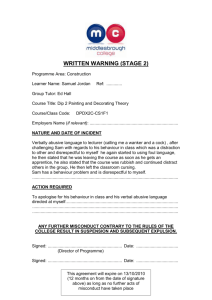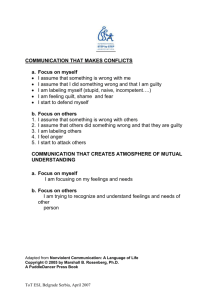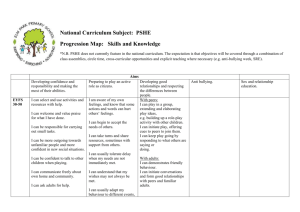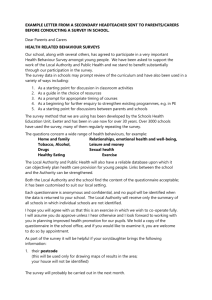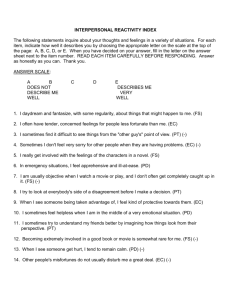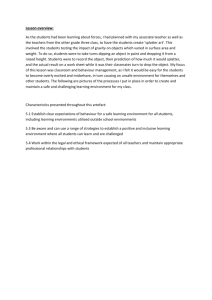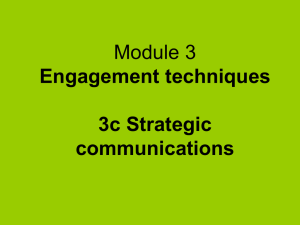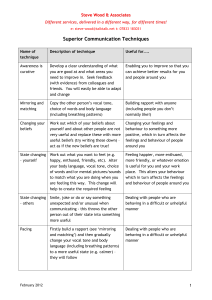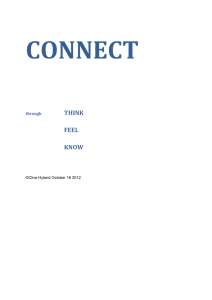communication social styles questionaire
advertisement
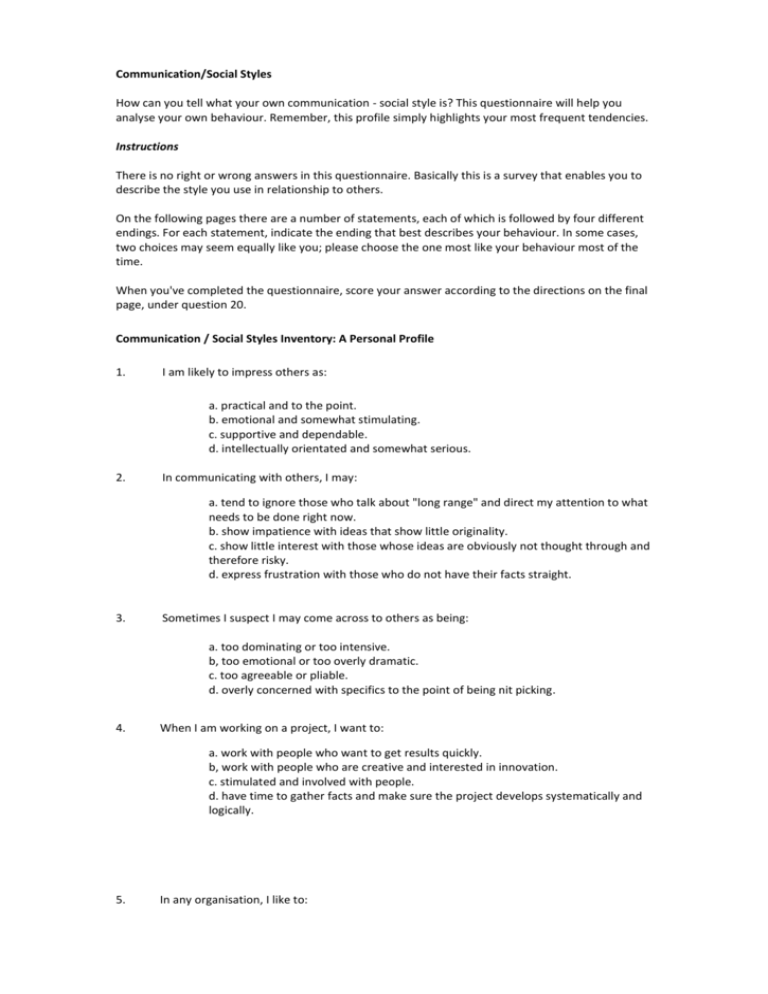
Communication/Social Styles How can you tell what your own communication - social style is? This questionnaire will help you analyse your own behaviour. Remember, this profile simply highlights your most frequent tendencies. Instructions There is no right or wrong answers in this questionnaire. Basically this is a survey that enables you to describe the style you use in relationship to others. On the following pages there are a number of statements, each of which is followed by four different endings. For each statement, indicate the ending that best describes your behaviour. In some cases, two choices may seem equally like you; please choose the one most like your behaviour most of the time. When you've completed the questionnaire, score your answer according to the directions on the final page, under question 20. Communication / Social Styles Inventory: A Personal Profile 1. I am likely to impress others as: a. practical and to the point. b. emotional and somewhat stimulating. c. supportive and dependable. d. intellectually orientated and somewhat serious. 2. In communicating with others, I may: a. tend to ignore those who talk about "long range" and direct my attention to what needs to be done right now. b. show impatience with ideas that show little originality. c. show little interest with those whose ideas are obviously not thought through and therefore risky. d. express frustration with those who do not have their facts straight. 3. Sometimes I suspect I may come across to others as being: a. too dominating or too intensive. b, too emotional or too overly dramatic. c. too agreeable or pliable. d. overly concerned with specifics to the point of being nit picking. 4. When I am working on a project, I want to: a. work with people who want to get results quickly. b, work with people who are creative and interested in innovation. c. stimulated and involved with people. d. have time to gather facts and make sure the project develops systematically and logically. 5. In any organisation, I like to: a. be giving orders or work independently; I don't want to waste time on "how are we going to do this". I just want to do it. b. give my opinions; I can take advice from people already successful in the area, not from those with no "track record". c. work collaboratively with people, not alone; I can accept advice and direction from positive authorities. d. make my own decisions based on the facts at hand; I can accept direction if I understand the logic behind it. 6. When circumstances prevent me from doing what I want, I tend to: a. review the situation for any deficiencies on my part and take new actions accordingly. b. create a new hypothesis quickly. c. analyse the motivations of others and develop a new feel for the situation. d. keep in mind all the basics or history to date and pinpoint all key obstacles. I modify my game plan after much thinking. 7. When I write a letter for business to someone I don't know, I usually try to: a. relate my purpose in writing and highlight what I want, need or expect of the other person. b. show my main points and how they work toward the future goals we both have. c. convey some of who I am and my style. d. give background and purpose of the communication in some detail. 8. In terms of how I think about time, I usually concentrate on: 9. a. my immediate actions and whether they work for today. b. my long-range goals or dreams and how to get there; I'm not very disciplined in use of time. c. how what I'm planning may affect other people d. ensuring the actions I take fit into the systematic program I've set up. When I meet people socially, I am likely to consider whether: a. they know what they're doing and can get things done. b. they're exciting and creative. c. they're friendly and open. d. they seem thoughtful and reflective. 10. When faced with people who hold a different point of view, I usually try to: a. rely on my abilities to pull ideas together and convince others of my ideas. b. find several places we agree on in order to build on these and move towards the future. c. place myself in their shoes and see their point of view. d. keep my composure and help others see things logically. 11. If I were to speak before a group who didn't know me well, I would hope to leave the impression of being: a. a pragmatic "mover" who could assist the group in solving problems. b. a broad-range thinker capable of making innovative contributions. c. a lively person clearly in touch with the group's mood and needs, thus able to help make an impact. d. a systematic thinker who could help the group analyse its problems and needs. 12. In tense meeting, I occasionally: a. attempt to bulldoze my opinion through because I'm frustrated by the process. b. let my hair down and express feelings better left unsaid. c. am swayed by others who may be strong personalities but not necessarily correct in the situation. d. miss the forest for the trees because I get caught in details. 13. Sometimes, when my behaviour seems extreme, others might feel I am: a. dominating, tough or harsh. b, moody, excitable or unpredictable. c. dependent, conforming or unsure. d. highly unemotional or detached. 14. I feel satisfied with myself when I: a. get more things accomplished than I've planned. b. develop new thoughts and create ideas that can be implemented. c. understand and respond in a helpful way to the feelings of others. d. solve a problem using a logical method. 15. I find I am most convincing when I am able to: a. present options to people and help them choose an alternative. b. stimulate people with new ideas and excite them into action. c. be in touch with my own feelings and resonate with those of others. d. use logic and facts to persuade people to my point of view. 16. When others pressure me, I am inclined to be overly: a. concerned with proving myself with immediate action. b. emotional and get carried away with my feelings. c. concerned with what others think and tend not to take action. d. analytical and critical of others. 17. In difficult situations, my approach sometimes results in being: a. too concerned with here and now and getting and doing what I want. b. so concerned with settling the battle and wanting to get to the future that I might misjudge the present situation. c. so concerned about others that I don't think through my own situation. d. too involved with concepts and ideas alone. 18. I like it when others tell me they think I'm: a. a person who knows where he or she is going and is going to get there. b. creative and stimulating. c. a dependable person who comes through for them. d. intellectually gifted. 19. When there's interference on a project, I usually think it's best to: a. concentrate on getting what I want accomplished right now. b. be original and say what I think. c. find out how others are feeling and make sure we can agree on a procedure. d. stick to a logical, systematic, proven approach. 20. Overall, I would describe myself as: a. pragmatic and forceful. b. stimulating and creative. c. willing and supportive. d. thoughtful and industrious. Scoring Add up each A, B, C and D you've noted and place those number here: A x5 = %A B x5 = %B C x5 = %C D x5 = %D Total 20 Total 100% Multiply each of your totals by 5 to come up with the percentage you scored in each category. For example, if you scored the following: A 5x5= 25% A B 12x5= 60% B C 3x5= 15% C D 0x5 = 0% D Total 20 Total 100% Key A =Driver B=Expressive C=Amiable D=Analytical
